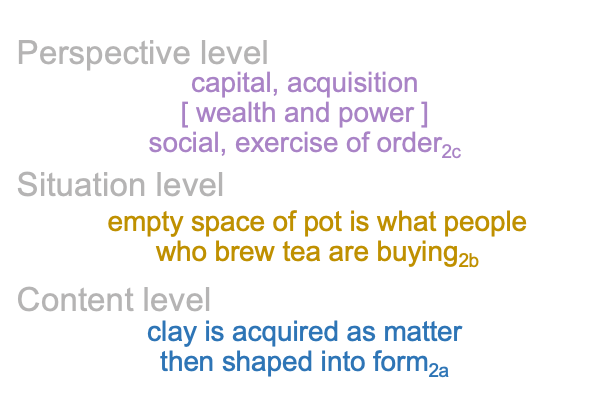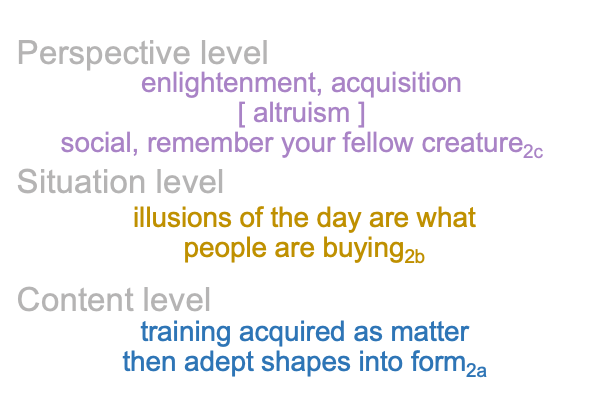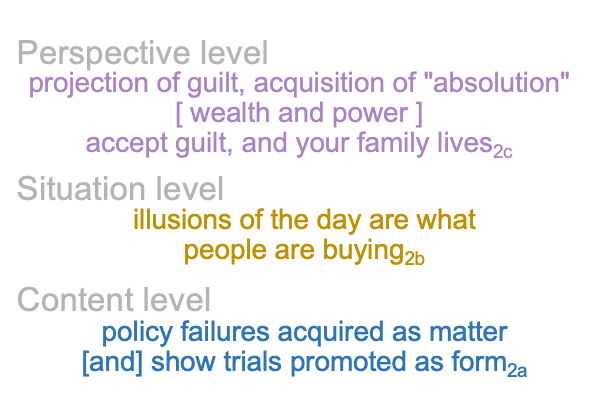0157 If all I wanted to do is acquire a clay pot by exercising my social and technical know-how, then the story would end with content-level understanding.
But, in the prior examples, it does not. Here is a picture of a virtual nested form in the category of secondness. A perspective-level actuality2c virtually brings a situation-level actuality2b into relation with the potential of a content-level actuality2a.

0158 If I ask the clay, “What do you get out of this?”
The answer comes back, “Nothing.”
And weirdly, it is the nothing inside the clay where people brew their tea.
Does that sound like “a pair of lacks”?
0159 Now, when I shift from a piece of clay on the content level, to an adept training in the Buddhist tradition, can I say that the adept is a piece of clay?
Does the adept empty himself or herself in order to gain happiness?

0160 The adept, like the clay, creates a hollow in which the objet a of the day can brew, releasing its aromatic [petit objet a], which tells the untrained mind, “This is the reality that you should buy into.”
This will make you happy.
A beautiful, high quality, clay pot is on sale today, at reduced price!
0161 But, what about the one my grandmother gave to me?
Destroy it. Replace it. Then, brew your tea with improved satisfaction.
The adept can see through the disturbance, contain the disturbance, release the disturbance.
It is as simple and as elegant as brewing a pot of tea.
Zen style.
0162 In sipping an illusion down to its dregs, the adept feels happiness. This is the happiness of the {acquisition of enlightenment [wealth and power] release from the illusions that people are buying}2c. [Wealth and power] is not what we think it is. The contiguity between acquisition and the exercise of order is dangerous. So, why not simply let the suffering go?
“Oh wait!”, the Master intones, “Remember your form.”
0163 Surely, the greatest manifestation of [wealth and power] is what evolutionary anthropologists call [altruism]. Who can afford to give with no expectation of return? No one can. The adept begs for his food and for alms, so others can give and expect no thing in return. Giving to a Buddhist monk is a moment of enlightenment.
0164 Zizek is correct in that Buddhism does not really grasp how jouissance1x, objet a2x, [petit objet a]2x and the big Other3x are radically intersubjective… or should I say?… “suprasubjective”. They are inscribed, so to say. But, they are not inscribed like pen on paper. They are inscribed like the contiguity between pen and paper. {Pen [inscribe] paper}2is the actuality2 that requires understanding. The inscription itself only requires recitation.
0165 With that, allow me to inscribe an observation.
Buddhism seems to put the evils of Soviet and Chinese Communism into the basket labeled “suffering”.
But, what about “evil”?
Are show trials evil?
Here is the observation as a virtual nested form in the category of secondness.

0166 On the content level, the normal context of a Stalinist state3a brings the dyadic actuality of {policy failures [need for blame] show trials}2a into relation with the possibility of ‘continuing current operations’1a.
On the situation level, the normal context of broadcasting3b brings the dyadic actuality of {accusation [constitutes] theatrical drama}2b or {illusion [transaction] hollow satisfaction}2b into relation with the possibility of ‘mollifying dissatisfaction with current operations’1b.
On the perspective level, the normal context of the Relativist One3c, the one who stands outside of all other jurisdictions, brings the dyadic actuality of {the projection of guilt as a judicial acquisition of “righteousness” [wealth and power] the social ordering of all when the accused confesses guilt}2c into relation with the potential of ‘a synthetic truth’1c, which claims that current operations are both necessary and inevitable and well… do we feel the jouissance1c?
0167 Oh, it all must make sense, since, if current operations fail, then we enter the night of the world.
Nobody wants that.
